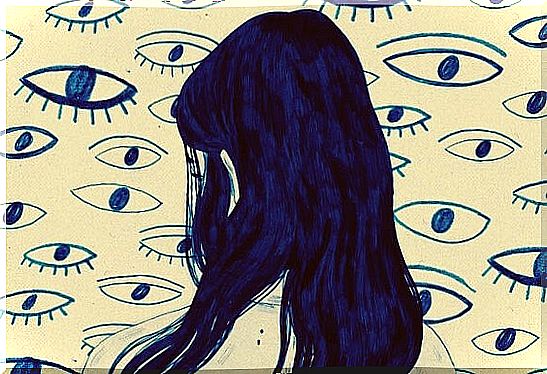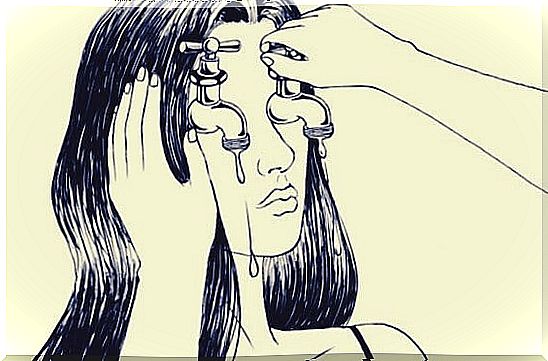Fear Makes Us Perceive The World Differently

It is always important to make it clear that there are in fact two kinds of fear. The first is adaptive and has the function of preparing us for a danger or for a threatening situation. In other words, this is an instinctive and reasonable response to protect us from potential risk.
The second type of fear is of a psychological or pathological nature. It just suddenly appears, without any real risk. Perhaps it is more accurate to say that it appears with imaginary danger or with a threat of exaggerated magnitude, which can hardly ever be properly articulated. It is as if a threat exists, but there is no way to determine exactly where it is or what it consists of.
Fear can manifest itself in many ways. What always corresponds is the fact that the feeling of fear or dread is completely exaggerated. Sometimes it leads to the same thoughts coming back over and over. Other times it can unleash a panic attack or lead to alienation.

The Cognitive Error in Anxiety
Through pathological fear, we develop an erroneous or distorted perception of the world. That means you select only that information about reality or only pay attention to what explains or could explain the threat. Likewise, that information is misinterpreted. In addition, the information affects you more than other things.
For example, someone who feels anxious when interacting with others tends to perceive only some aspects of others. He will be very alert to any gesture of rejection, no matter how small. A silence can be interpreted as an indication that he is not liked or that others do not want to talk to him. The signs of acceptance or interest are not noticed unless they are extremely visible.
If the anxiety has a more obscure origin, the sufferer will see “fatal signs” in, for example, any natural phenomenon. A very colorful sunrise leads to the feeling that ‘something is going to happen’. A moon that is too bright creates fear, without knowing why.

The Four Factor Theory
Psychologist Michael Eysenck has devised the conceptual ‘four factor theory’. It defines the main ways in which an anxious person’s thought forms based on his own perception. Each of these ways implies a cognitive bias. The four factors are:
- A distorted perception of a specific stimulus. This occurs when the fear is aimed specifically at an object or a very precise aspect of reality. This leads to the so-called ‘phobias’. If the fear relates to one’s own behavior, it is called “social phobia.”
- A disturbed perception of one’s own body and one’s own physical reactions. It appears when its own organism is the battlefield. Its own functions and reactions are regarded as warning signals. This leads to an ‘anxiety disorder’.
- A distorted perception of one’s own thinking and of personal ideas. In this case, what happens in the head is seen as risky or threatening. This causes obsessive-compulsive disorder (OCD).
- A global distorted perception. This is when the fear is directed at all of the above factors: specific things, one’s own behavior, one’s own body or one’s own mind. When this happens, we are talking about Generalized Anxiety Disorder (GAD).
Each of these expressions of fear leads to seeing reality in a totally biased way. People who suffer from this have a great resistance, or it is somehow impossible for them, to take in information that judges whether what they perceive is well founded.

Work on the misinterpretation caused by fear
All anxiety disorders can be treated, even in the most severe cases. A therapy aimed at overcoming these symptoms will ensure that the afflicted by them learns to turn his attention to other aspects of reality, which he now neglects.
It is possible to learn to give a broader meaning to what we observe. Sometimes we just need someone to help us understand that feeling a heart beating fast doesn’t mean we’re about to have a heart attack. Or that it’s normal that not everyone likes us, but that doesn’t mean others reject us.
Any kind of fear matters. If we ignore the symptoms as a confrontation strategy, they tend to increase and attack our personality. Seeking help early is the best way to deal with these moods that cause us so much suffering.








